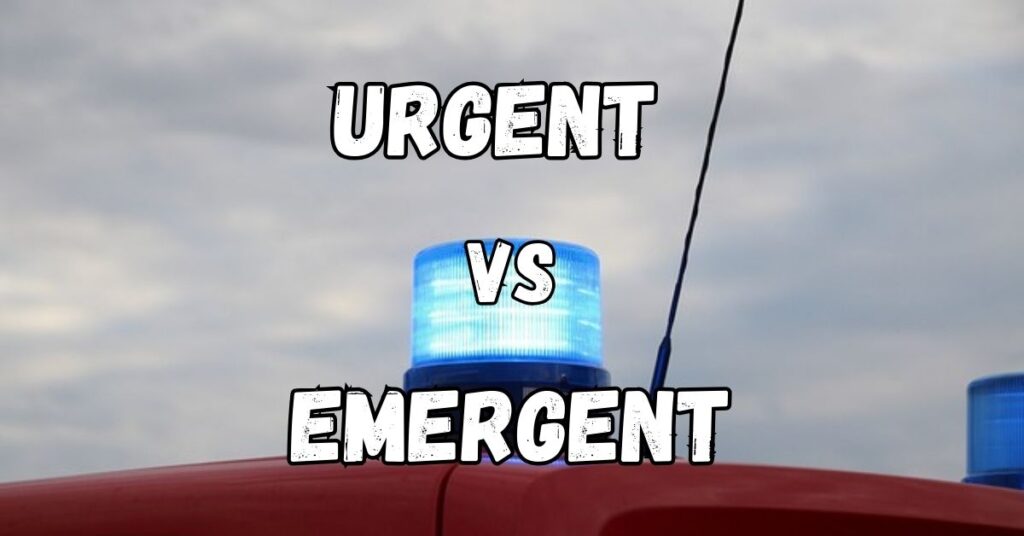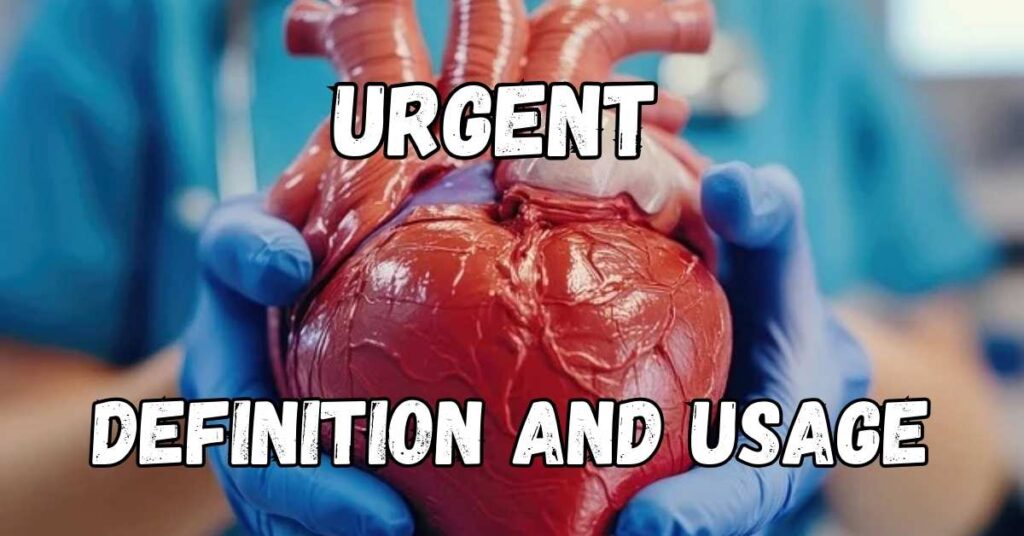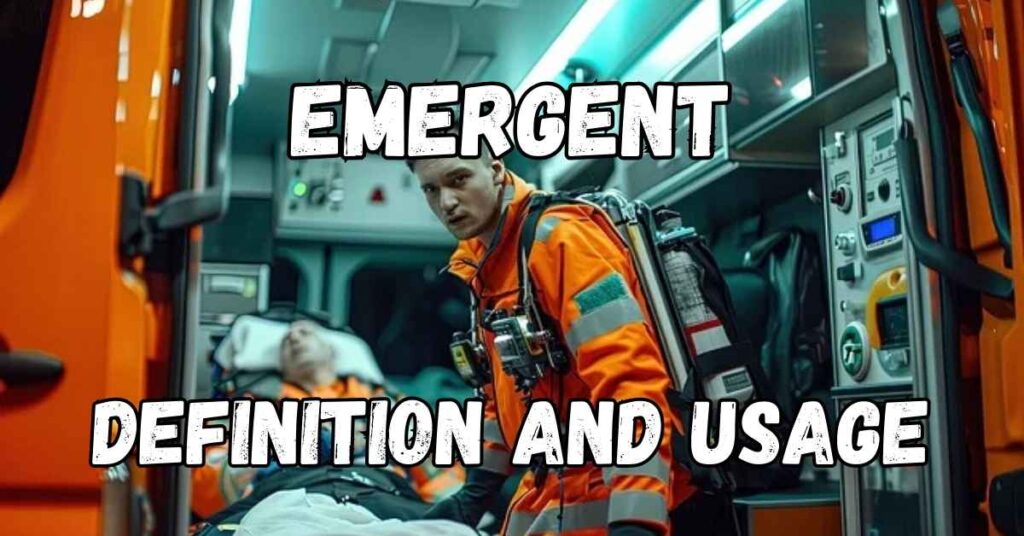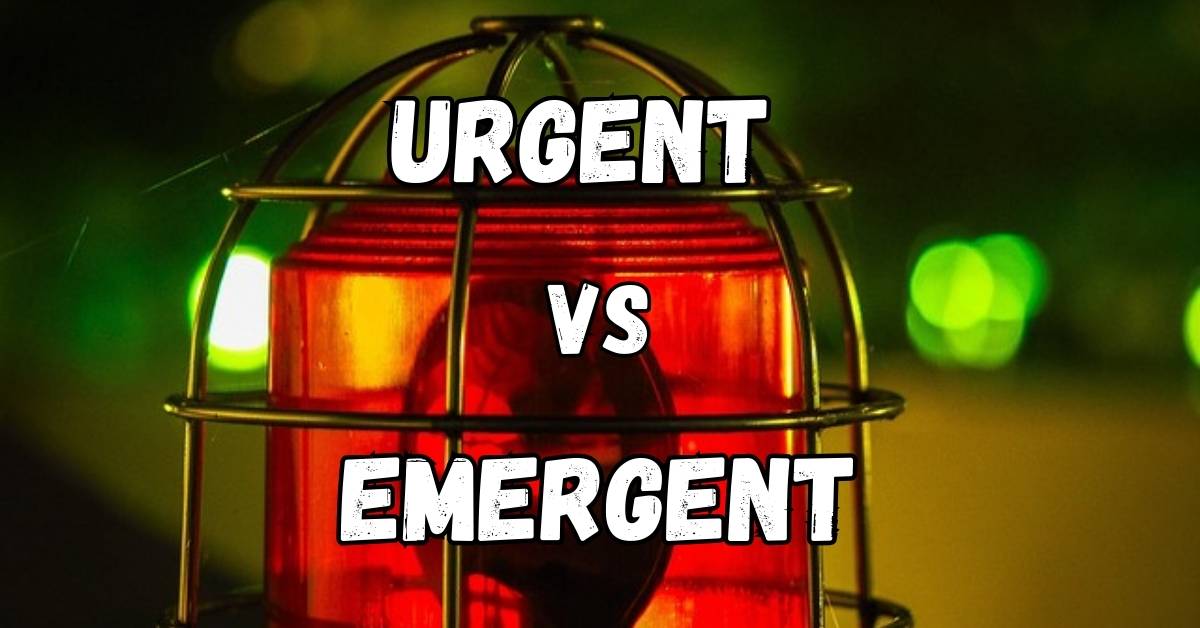Urgent vs Emergent situations often create confusion, especially in the context of healthcare. Understanding the difference between these two terms is crucial for making informed decisions about when to seek medical attention.
While urgent conditions require immediate action but are not life-threatening, emergent situations arise suddenly and may pose serious health risks or even life-threatening conditions.
This distinction plays a vital role in how we approach various medical scenarios, from visiting an urgent care center for minor injuries to calling for emergency services during a medical emergency. In this article, we will explore the definitions, usage, and examples of both terms to clarify their meanings.
Quick Summary
Urgent refers to situations that require immediate attention but are not life-threatening. On the other hand, emergent describes situations that arise suddenly and may involve serious health risks or life-threatening conditions.
Knowing when to use each word can improve communication, especially when discussing healthcare or medical conditions.
Understanding Urgent vs Emergent

The distinction between urgent and emergent is crucial, particularly in the context of healthcare. For instance, if someone experiences severe pain that is not life-threatening, they may need to visit an urgent care facility.
However, if someone suffers a serious injury or shows signs of a medical emergency, they should seek emergency services immediately. Understanding these differences can help you make informed decisions about when to seek medical help.
Origins of the Urgent
Urgent originated in the mid-15th century, derived from the Old French word “urgent,” meaning “pressing” or “impelling.” This, in turn, comes from the Latin “urgentem,” the present participle of “urgere,” which means “to press hard” or “to urge.”
The root reflects a sense of pressing need, linking to various languages that convey similar meanings, such as Lithuanian and Gothic. The concept of urgency has evolved to describe situations requiring immediate attention, particularly in medical contexts where timely intervention is crucial for effective treatment.
Origins of the Emergent
Emergent originates from the Latin term “ēmergent-em,” meaning “rising from what surrounds it” or “coming into view.” It first appeared in Middle English around 1450. Philosophically, the concept of emergence has roots in Aristotle’s ideas about whole entities possessing properties that their individual parts do not.
In modern contexts, the study of emergent phenomena spans various disciplines, particularly within complexity science, highlighting how new properties arise unexpectedly from interactions within systems. This interdisciplinary approach has deepened our understanding of emergent properties and their significance in both science and philosophy
Urgent: Definition and Usage

Urgent describes situations that require immediate attention but are not life-threatening. In healthcare, urgent conditions often demand prompt medical care to prevent complications or worsening health.
Understanding the definition of urgent helps individuals recognize when to seek care at an urgent care facility rather than an emergency room. This distinction is essential for ensuring timely treatment while avoiding unnecessary emergency services for non-critical issues.
Urgent Definition
In medical contexts, urgent refers to conditions that need attention within a specific timeframe, typically within 12 hours. These situations may include severe pain, infections, or minor injuries that require prompt evaluation and treatment.
Recognizing urgent conditions allows patients to seek appropriate care without delay, ensuring better health outcomes and effective management of their medical issues.
Urgent Usage
Urgent typically applies to conditions that are serious but not critical. For example, if you have an infection that needs treatment soon but isn’t life-threatening, you would seek care at an urgent care center rather than an emergency room.
Other examples include needing a physical examination for a job or addressing minor injuries like sprains or cuts.
10 Synonyms of Urgent
Some synonyms for urgent include
- Pressing
- Critical
- Immediate
- Vital
- Essential
- Important
- Crucial
- Necessary
- Imperative
- Significant
Each of these words conveys a sense of importance and timeliness.
Emergent: Definition and Usage

Emergent refers to situations that arise suddenly and require immediate attention due to their potential severity. In healthcare, it describes conditions that can pose serious health risks or even life-threatening scenarios.
Understanding the definition of emergent is crucial for recognizing when to seek urgent medical care, as these situations often demand rapid intervention to prevent further complications or deterioration of health.
Emergent Definition
In medical terminology, emergent indicates a condition that develops unexpectedly and necessitates immediate action. This could involve acute symptoms such as severe chest pain, difficulty breathing, or signs of a stroke.
Recognizing these emergent conditions is vital for ensuring timely and effective medical treatment, which can significantly impact patient outcomes and overall health status.
Emergent Usage
Emergent describes conditions that pose significant threats to health or life. For example, if someone has symptoms of a stroke or severe chest pain indicating a heart attack, these situations are classified as emergent. Emergency medical care is crucial in these cases to prevent further health decline or even death.
Synonyms of Emergent
Synonyms for emergent include
- Developing
- Arising
- Surfacing
- Unexpected
- Sudden
- Urgent (in some contexts)
- Nascent
- Newly appearing
- Oncoming
- Imminent
These words emphasize the unexpected nature of such situations.
Side by Side Comparison
| Aspect | Urgent | Emergent |
| Definition | Requires immediate action | Arises unexpectedly |
| Context | Non-life-threatening situations | Situations needing quick judgment |
| Examples | Medical appointments | Natural disasters |
Everyday Usage Examples

Understanding how to use the terms urgent and emergent in everyday situations can help clarify communication. For instance, when discussing health issues, knowing whether a condition is urgent or emergent can guide individuals to seek the appropriate level of care.
This distinction is essential not only in medical contexts but also in various aspects of daily life, such as work deadlines or personal emergencies.
Urgent Examples
An urgent situation might include needing to see a doctor for a worsening infection that requires prompt treatment. Another example is a project deadline approaching quickly at work, necessitating immediate attention.
A car that needs repairs to avoid a breakdown also qualifies as urgent. Additionally, a child with a high fever needs timely care, and submitting a job application before the deadline is crucial.
Emergent Examples
Emergent situations often involve unexpected health crises, such as a sudden heart attack requiring immediate medical intervention. A natural disaster, like a flood, demands swift evacuation measures from authorities.
An outbreak of illness in a community presents an emergent health crisis needing rapid response. Similarly, a severe allergic reaction can escalate quickly, and any signs of stroke must be treated as emergent to prevent serious consequences.
Read More: Lucas’s or Lucas: What’s the Difference?
Conclusion
Understanding the difference between Urgent vs Emergent is essential for effective communication, particularly in healthcare. While urgent situations require prompt attention without being life-threatening, emergent conditions demand immediate action due to their potential severity.
Knowing when to seek care at an urgent care facility versus an emergency room can significantly impact health outcomes. By recognizing these distinctions, you can make informed decisions about your health and well-being, ensuring that you receive the appropriate level of care when it matters most.
FAQs: Urgent vs Emergent
What is the difference between urgent and emergent?
The key difference is that urgent situations require immediate attention but are not life-threatening, while emergent situations arise suddenly and may pose serious health risks or life-threatening conditions.
What level of triage is urgent?
Urgent conditions typically fall under Level 2 triage, indicating that they require prompt medical attention but are not critical emergencies.
What is the medical definition of urgent?
In medical terms, urgent refers to a condition that requires treatment within 12 hours to prevent the onset of an emergency medical condition, ensuring timely care without immediate danger to life.
More Article: Usage or Useage: What’s the Difference?

